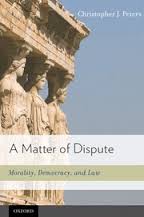|
Tag
|
Ind1
|
Ind2
|
Isi
|
|
001
|
|
|
INLIS000000000009223
|
|
005
|
|
|
20221027054440
|
|
008
|
|
|
221027################|##########|#eng##
|
|
020
|
#
|
#
|
$a 978-0195387223
|
|
035
|
#
|
#
|
$a 0010-0520009223
|
|
041
|
|
|
$a eng
|
|
082
|
#
|
#
|
$a 340.112
|
|
084
|
#
|
#
|
$a 340.112 PET m
|
|
100
|
0
|
#
|
$a Peters, Christopher J.
|
|
245
|
1
|
2
|
$a Matter of dispute : morality, democracy, and law. /$c Christopher J.Peters
|
|
260
|
#
|
#
|
$a New York :$b Oxford University Press,$c 2011
|
|
300
|
#
|
#
|
$a xvi, 360 p. ; 24 cm ; $c 24 cm
|
|
520
|
#
|
#
|
$a Law often purports to require people, including government officials, to act in ways they think are morally wrong or harmful. What is it about law that can justify such a claim? In A Matter of Dispute: Morality, Democracy, and Law, Christopher J. Peters offers an answer to this question, one that illuminates the unique appeal of democratic government, the peculiar structure of adversary adjudication, and the contested legitimacy of constitutional judicial review. Peters contends that law should be viewed primarily as a device for avoiding or resolving disputes, a function that implies certain core properties of authoritative legal procedures. Those properties - competence and impartiality - give democracy its advantage over other forms of government. They also underwrite the adversary nature of common-law adjudication and the duties and constraints of democratic judges. And they ground a defense of constitutionalism and judicial review against persistent objections that those practices are "counter-majoritarian" and thus nondemocratic. This work canvasses fundamental problems within the diverse disciplines of legal philosophy, democratic theory, philosophy of adjudication, and public-law theory and suggests a unified approach to unraveling them. It also addresses practical questions of law and government in a way that should appeal to anyone interested in the complex and often troubled relationship among morality, democracy, and the rule of law. Written for specialists and non-specialists alike, A Matter of Dispute explains why each of us individually, and all of us collectively, have reason to obey the law - why democracy truly is a system of government under law.
|
|
650
|
|
4
|
$a Constitutional law --Moral and ethical aspects.
|
|
650
|
|
4
|
$a Dispute resolution (Law) --Moral and ethical aspects; Democracy;
|
|
650
|
|
4
|
$a Rule of law --Philosophy; Law --Moral and ethical aspects;
|
|
990
|
#
|
#
|
$a 22640/MKRI-P/XII-2011
|
|
990
|
#
|
#
|
$a 22640/MKRI-P/XII-2011
|
|
990
|
#
|
#
|
$a 22640/MKRI-P/XII-2011
|
|
990
|
#
|
#
|
$a 22641/MKRI-P/XII-2011
|
|
990
|
#
|
#
|
$a 22641/MKRI-P/XII-2011
|
|
990
|
#
|
#
|
$a 22641/MKRI-P/XII-2011
|
